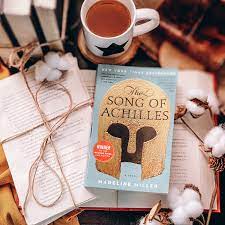The Song of Achilles

In the vast expanse of literary epics, “The Song of Achilles” by Madeline Miller stands as a beacon of brilliance, a modern masterpiece that breathes new life into the ancient tale of love, war, and destiny. Set against the backdrop of Greek mythology, Miller’s retelling of the legendary bond between Achilles and Patroclus transcends time, capturing the hearts and minds of readers with its poignant narrative, lyrical prose, and profound exploration of humanity’s deepest complexities.
At its core, “The Song of Achilles” is a love story—a testament to the enduring power of love in the face of adversity. Through the eyes of Patroclus, the novel unveils the tender yet tumultuous relationship between him and Achilles, the greatest of the Greek heroes. From their humble beginnings as childhood friends to their tragic end on the battlefield of Troy, Miller weaves a tapestry of emotions that resonates with readers on a visceral level. Their love is not merely romantic; it is a bond forged in the crucible of shared experiences, mutual respect, and unwavering loyalty.
The Eternal Resonance
Central to the novel’s allure is Miller’s masterful portrayal of character dynamics. Achilles, with his godlike prowess and mortal vulnerabilities, emerges as a complex figure torn between his destiny as a warrior and his desire for a life of peace with Patroclus. His internal struggles mirror the eternal conflict between duty and desire, fate and free will—a theme that reverberates throughout Greek mythology. Patroclus, on the other hand, is depicted with a rare vulnerability and sensitivity, serving as the moral compass that grounds Achilles amidst the chaos of war.
Beyond the realm of romance, “The Song of Achilles” delves deep into the visceral horrors of war and the profound impact it leaves on the human psyche. Miller’s vivid descriptions of battle scenes evoke a sense of dread and despair, juxtaposed with moments of courage and heroism. Through the lens of Achilles and Patroclus, readers bear witness to the brutal realities of warfare—the loss of innocence, the scars of trauma, and the fleeting nature of glory.
What sets Miller’s retelling apart is her emphasis on the marginalized voices within Greek mythology. In “The Song of Achilles,” she gives voice to characters like Thetis, Achilles’ mother, whose love for her son is overshadowed by her divine obligations, and Briseis, the Trojan captive whose agency is often overlooked in traditional retellings. By humanizing these characters and exploring their perspectives, Miller challenges the traditional narrative of heroism and sheds light on the untold stories of those relegated to the sidelines of history.
A Literary Odyssey
Furthermore, “The Song of Achilles” serves as a testament to the enduring relevance of classical mythology in contemporary literature. Miller seamlessly blends ancient myths with modern sensibilities, breathing new life into age-old tales for a new generation of readers. Through her nuanced exploration of themes such as love, identity, and the quest for meaning, she invites readers to reexamine timeless questions that have plagued humanity since time immemorial.
Conclusion
“The Song of Achilles” stands as a timeless masterpiece—a literary odyssey that transcends the boundaries of time and space. With its rich tapestry of characters, evocative prose, and profound insights into the human condition, Madeline Miller’s retelling of the epic tale of Achilles and Patroclus continues to captivate and inspire readers around the world. Like the heroes of old, their story echoes through the ages, reminding us of the enduring power of love, the futility of war, and the eternal quest for meaning in an ever-changing world.






